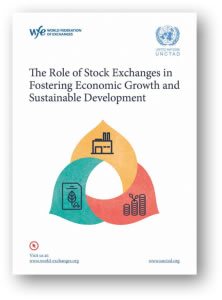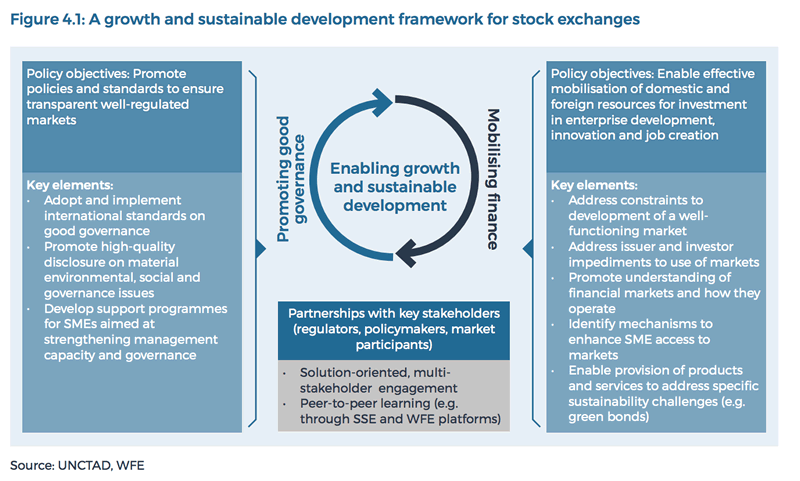The report, entitled The Role of Stock Exchanges in Fostering Economic Growth and Sustainable Development, was officially launched at the opening session of the 57th WFE Annual Meeting in Bangkok, Thailand. The report explains how stock exchanges operate, and why they matter; longer-term developmental challenges; and finally, how exchanges might be able to address some of those challenges.
“Stock exchanges are an important part of the global investment chain and can be instrumental in helping mobilise the massive amounts of investment needed to achieve the United Nations Sustainable Development Goals. They can also serve as a unique platform for promoting responsible business and good corporate governance. Indeed, they have already made remarkable progress in this respect,” said James Zhan, Director, Investment and Enterprise, UNCTAD, and Editor in Chief, United Nations World Investment Report.
“We will continue to support stock exchanges worldwide, in close collaboration with The World Federation of Exchanges and their stakeholders, in their efforts to promote investment in economic growth and sustainable development.”

“Exchanges exist to foster economic development and safeguard the financial system. Well-functioning exchanges enable economic growth and development, and can only do this within an environment that is regulated, secure, transparent and equitable,” said Nandini Sukumar, CEO, The WFE.
“Part of the reason the WFE and UNCTAD did this report is to better understand the specifics of how exchanges contribute to growth. For us, it’s the beginning of a journey. We hope this joint report with UNCTAD serves as a baseline to work towards the creation of more enabling environments globally.
Key findings of the report
The report identifies two primary mechanisms through which stock exchanges can contribute to development:
Mobilising resources, both domestic and foreign portfolio flows, for sustainable economic growth and development. In addition to the core financing function of exchanges, the report also looks at what exchanges are doing to improve SME access to finance through dedicated markets, and to marshal funds to address sustainability challenges.
Promoting good governance in business practices, through the promotion of greater disclosure from their listed companies, including Environmental, Social & Governance (ESG) disclosure.

The ability of exchanges to perform these roles is dependent, however, on the existence of an enabling environment, comprising relevant policy, processes and institutional structures. The report has therefore developed a framework for stock exchanges and stakeholders that can be used as a preliminary guideline.
The UNCTAD/WFE report also highlights the importance of SMEs in economic development and provides an overview of the current SME platform universe at stock exchanges.
The SSE highlighted in its 2016 Report on Progress examples of stock exchanges contributing to decent work and economic growth, and highlighted this as one of the five Sustainable Development Goals that stock exchanges can contribute to advancing:
Goal 5: Gender Equality
Goal 8: Decent Work and Economic Growth
Goal 12: Sustainable Consumption and Production Patterns
Goal 13: Climate Change
Goal 17: Global Partnerships
In the third chapter of the joint report, a review of all efforts by stock exchanges to promote sustainable development shows various initiatives and tools being adopted to promote environmental, social and governance (ESG) disclosure. This includes the progress of the SSE’s campaign to close the ESG guidance gap which doubled the number of stock exchanges offering guidance on ESG disclosure, and aims to have all exchanges providing guidance on this topic.
About the Sustainable Stock Exchanges (SSE) Initiative
The SSE is a peer-to-peer learning platform for exploring how exchanges—in collaboration with investors, regulators, and companies—can encourage sustainable investment and enhance corporate transparency, and ultimately performance, on ESG (environmental, social and corporate governance) issues. The SSE is convened by the UN Conference on Trade and Development (UNCTAD), the UN Global Compact, the UN Environment Program Finance Initiative (UNEP FI), and the Principles for Responsible Investment (PRI). All interested parties are encouraged to visit the SSE website (www.SSEinitiative.org) for more information on specific exchanges’ sustainability efforts and further opportunities to advance the integration of sustainability within capital markets.
About The WFE
The World Federation of Exchanges (WFE) is the global industry association for exchanges and clearing houses. WFE exchanges are home to nearly 45,000 listed companies, and the market capitalisation of these entities is over $67.9 trillion. The WFE is the definitive source for exchange-related statistics, and publishes over 350 market data indicators. The WFE works with standard-setters, policy makers, regulators and government organisations around the world to support and promote the development of fair, transparent, stable and efficient markets.


